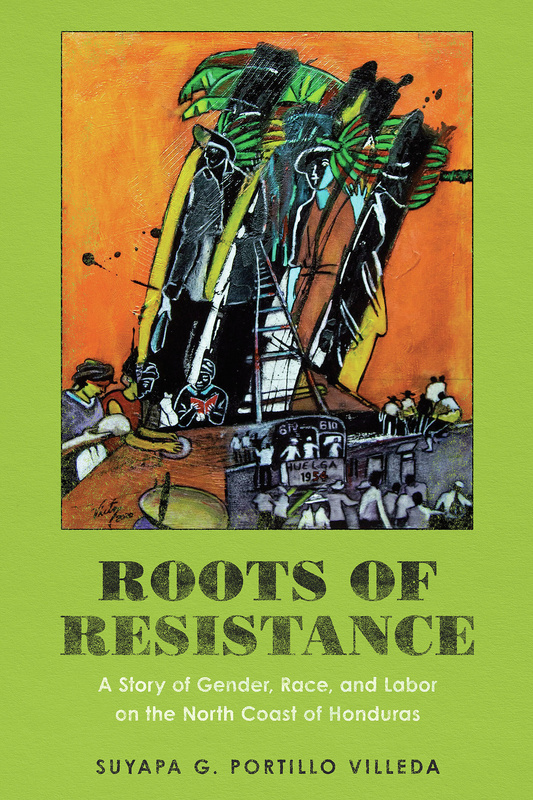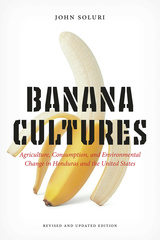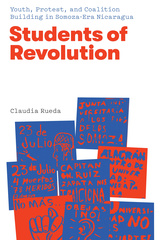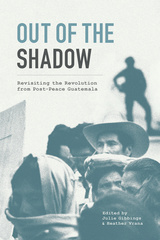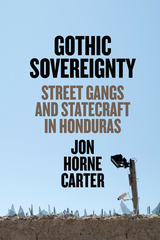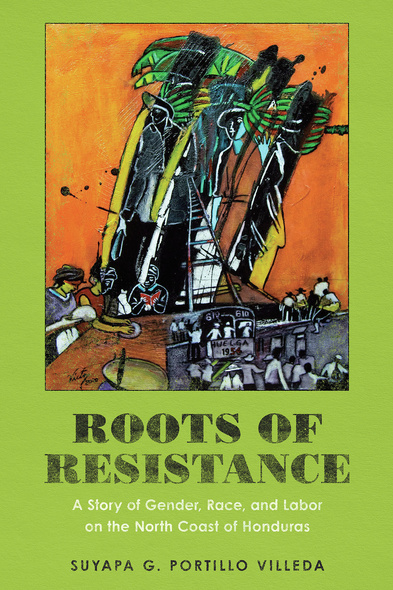
Roots of Resistance
A Story of Gender, Race, and Labor on the North Coast of Honduras
Winner of the 2021 Sara A. Whaley Prize of the National Women’s Studies Association (NWSA)
A first-of-its-kind study of the working-class culture of resistance on the Honduran North Coast and the radical organizing that challenged US capital and foreign intervention at the onset of the Cold War, examining gender, race, and place.
On May 1, 1954, striking banana workers on the North Coast of Honduras brought the regional economy to a standstill, invigorating the Honduran labor movement and placing a series of demands on the US-controlled banana industry. Their actions ultimately galvanized a broader working-class struggle and reawakened long-suppressed leftist ideals. The first account of its kind in English, Roots of Resistance explores contemporary Honduran labor history through the story of the great banana strike of 1954 and centers the role of women in the narrative of the labor movement.
Drawing on extensive firsthand oral history and archival research, Suyapa G. Portillo Villeda examines the radical organizing that challenged US capital and foreign intervention in Honduras at the onset of the Cold War. She reveals the everyday acts of resistance that laid the groundwork for the 1954 strike and argues that these often-overlooked forms of resistance should inform analyses of present-day labor and community organizing. Roots of Resistance highlights the complexities of transnational company hierarchies, gender and race relations, and labor organizing that led to the banana workers' strike and how these dynamics continue to reverberate in Honduras today.
This is an ambitious project with many strengths. First and foremost, Portillo succeeds in recovering the voices of women workers... Portillo’s work on domestic relations reveals rich ground for future studies on the interplay of labor and gender in banana zones...Portillo has succeeded in writing a bottom-up study of the 1954 strike that will be of interest to scholars interested in integrating women workers’ stories into broader labor histories.
Portillo Villeda’s history of the 1954 strike joins a vast literature on the role and legacy of the fruit companies that once regarded the countries of Central America as their fiefdoms. It is eminently readable, empathetic, and meticulously researched but also entirely original in its attention to the gendered and racialized dimensions of the strike. In sum, her book should become essential reading about the labor movement in Central America, proof that it is possible to say something truly new about an already well-trodden episode in the region’s arduous history.
This book, more than any other recent publication about Honduran history, not only deeply contextualises the social and political development of Honduras after the 2009 coup, it simultaneously offers deep historical perspective for characterising the outcome of the recent November 2021 general elections...[Roots of Resistance] is clearly written, and very readable for a range of audiences...This is a major and unique contribution to modern Honduran and Central American historiography.
Roots of Resistance offers a deeply moving workers’ history of the 1954 [Great Banana Strike]...Roots of Resistance is a striking piece of scholarship. In addition to the book’s myriad insights, Portillo Villeda writes with a distinct humanity that professional historians frequently shy away from.
The monumental struggles discussed in Roots of Resistance can serve as a lesson for workers and those who are committed to serving the people...teaching, researching, and writing in Central American Studies should not be limited to mere interpretation of the conditions of peoples’ existence. It should also spur revolutionary change. Modeling the need for a historical and materialist analysis and method, Portillo’s Roots of Resistance contributes to this political and intellectual project.
Suyapa Portillo Villeda advances a bold argument about the relationship between the Honduran resistance to the destructive coup of 2009 and its roots in the deep Caribbean capitalist history of this so-called classic banana republic. She does so by scrutinizing the relationships between race, gender, and labor, understood with broad subaltern sensibilities before and after the great banana plantation strike of 1954. She has discovered new documentation, but its pioneering evidentiary base originates in her use of rich oral histories, especially from women, that enliven her analysis. In this regard, Roots of Resistance engages not only the older historiography of the United Fruit Company in Central America and the Caribbean but also with debates about social movements, their legacies, and memories across generations.
Grounded in oral histories that revolve around the great strike of 1954 led by banana workers, Roots of Resistance offers a much-needed intersectional approach to histories of labor activism in Honduras by integrating race, class, and gender. Suyapa Portillo Villeda relates her stories with an underlying sense of urgency driven not only by her interest in documenting past struggles but by a desire to show their relevance for the future of Honduras and Hondurans.
Glossary
Preface
Acknowledgments
Introduction: Honduran Workers—New Voices, Old Memories
1. Intersecting Projects: Contested Visions for the North Coast
2. Revolutionary Antecedents to the 1954 Strike: Liberals, Rebels, and Radicals
3. Life and Labor in Banana Fincas
4. The Making of a Campeño and Campeña Culture: Race, Gender, and Resistance
5. “Mujeres que cuidaban hombres y vendedoras ambulantes”: Gendered Roles and Informal Work on the North Coast
6. ¡La Gran Huelga del 1954! Labor Organizing in the Banana Labor Camps
7. Contemporary Movement Leaders Reflect on the Legacy of the 1954 Strike
Conclusion
Appendices
A. Los 30 Puntos: Tela Railroad Company Worker Demands
B. Central Strike Committee 7 Demands of Company and Honduran Government, May 17, 1954
C. Standard Fruit Company Worker Strike Demands, May 7, 1954
D. Signed Contract between Standard Fruit Company, Agúan Valley, the Members of the Central Strike for Labor Relations
E. Program of the Honduran Revolutionary Democratic Party
F. Brief Selected Chronology of Labor and Political Events in Honduras
G. Table of Early Signs of Worker Actions and Strikes in Honduras
Notes
Bibliography
Index

